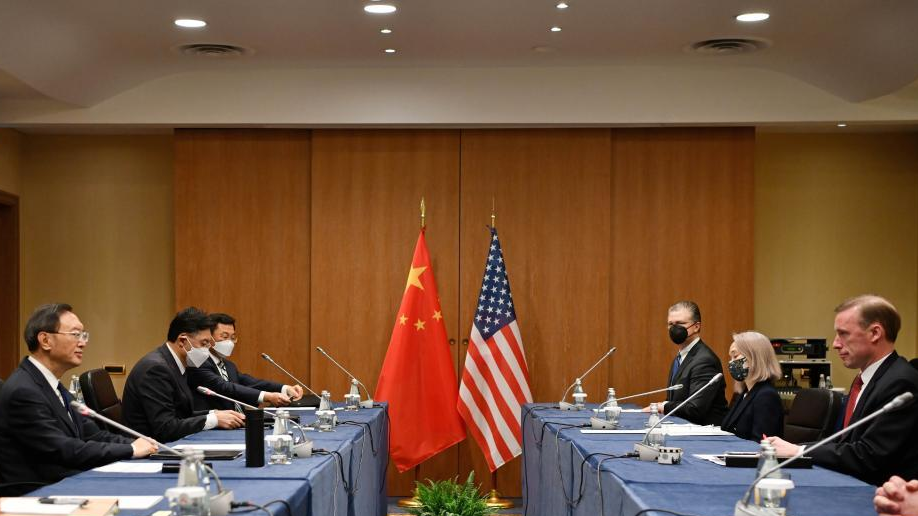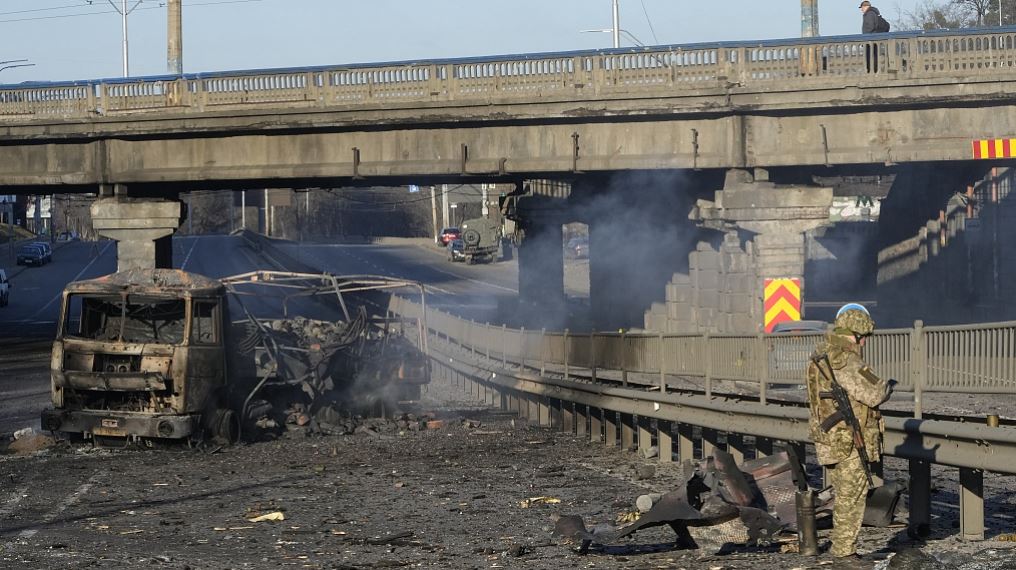
Yang Jiechi (1st L), a member of the Political Bureau of the Communist Party of China (CPC) Central Committee and director of the Office of the Foreign Affairs Commission of the CPC Central Committee, meets with U.S. National Security Advisor Jake Sullivan (1st R) in Rome, Italy, March 14, 2022. /Xinhua
Yang Jiechi (1st L), a member of the Political Bureau of the Communist Party of China (CPC) Central Committee and director of the Office of the Foreign Affairs Commission of the CPC Central Committee, meets with U.S. National Security Advisor Jake Sullivan (1st R) in Rome, Italy, March 14, 2022. /Xinhua
Editor's note: Bradley Blankenship is a Prague-based American journalist, political analyst and freelance reporter. The article reflects the author's opinions and not necessarily the views of CGTN.
China's top diplomat, Yang Jiechi, met U.S. National Security Advisor Jake Sullivan on March 14 amid a complex global geopolitical landscape. Though the meeting was planned as a follow-up to Chinese President Xi Jinping and U.S. President Joe Biden's virtual summit last November, the fact that the world's two most important countries can meet in such situations is a welcomed sign.
Still, the U.S. side seems intent on sowing discord, for example, on the issue of the Russia-Ukraine conflict. Before the meeting, media reports suggested that Russia had requested military equipment from China to aid in its "special operation," citing a U.S. official. For their part, China and Russia have firmly denied this and American allies in Europe have said they have no knowledge of this having taken place.
This is clear disinformation that follows a strategy, whether it be by the media or by U.S. officials who are "leaking" this information to the media (or some combination of both), of trying to tie China to the conflict somehow. And this is because Russia and China have an extremely important strategic partnership that the United States fears.
The goal is to either force Beijing to cut its close ties with Moscow or make China suffer for keeping them. This was also apparent from Sullivan's threats ahead of the meeting, saying "that there will absolutely be consequences for large-scale sanctions evasion efforts or support to Russia" from China.
"We will not allow that to go forward and allow there to be a lifeline to Russia from these economic sanctions from any country, anywhere in the world," Sullivan said, referring to potential sanctions on China.
It should also be noted, as was reported earlier this month, the United States was planning to sanction India for its reliance on Russian military equipment. On March 14, the Hindustan Times, quoting an official familiar with the matter, said that India is finalizing a payment system to maintain important trade lines with Russia despite Western-led sanctions. So it could be the case, though it would be a disaster, that the U.S. even sanctions one of its key Indo-Pacific allies in its quest to isolate Russia economically.
Washington is basically telling the world that its sanctions, which are not rooted anywhere in international law nor existing multilateral mechanisms, are gospel and that neutrality is not an option. Note that the last time the world was bifurcated into two competing blocs, a majority of the planet maintained a "non-aligned" status, meaning they were politically neutral. Washington apparently doesn't respect this principle.
But the reality is that countries are, per international law, entitled to pursue their own development schemes and engage in trade however they see fit. Just looking at a map of countries that have sanctions on Russia makes it clear that it's mostly the U.S. and its allies. This is not the real international community, e.g., all of the countries in the world that are deciding to isolate Russia.

A Ukrainian soldier stands beside a burnt military truck in a street in Kyiv, Ukraine, February 26, 2022. /CFP
A Ukrainian soldier stands beside a burnt military truck in a street in Kyiv, Ukraine, February 26, 2022. /CFP
Countries like China and India are under no obligation to carry water for U.S. foreign policy, especially when it undermines their core interests and development strategies. As two countries that have leaned into globalization, the idea that either of them would endorse the deglobalization of Russia – a horrible precedent, to be frank – is absurd.
Furthermore, in the case of China, just because Beijing enjoys close ties to Moscow does not mean it has endorsed any particular side in the conflict.
One of my favorite idioms springs to mind: to walk and chew gum at the same time, meaning to be able to do two things at once. When it comes to having close ties to both Ukraine and Russia, China can certainly walk and chew gum.
China has extraordinary economic ties with Ukraine and has a laundry list of investments in the country since Ukraine is signed onto the China-led Belt and Road Initiative (BRI). It is quite literally in China's interest for the conflict to come to a peaceful resolution as soon as possible. China's close ties to Russia do not negate this fact.
It's actually for this reason, as I have argued before, that China should help mediate in the peace talks. But, despite what Washington would like to see, it doesn't necessarily have to be at the expense of its diplomatic ties to either country. China has long followed the principle of non-alignment and has been steadfast in its opposition to unilateral sanctions, which is rooted in the fact that they are illegal under international law.
For its part, Washington will have to get used to people not wanting to help enforce its geopolitical ambitions of maintaining its global hegemony. Inevitably, this will only isolate the U.S. in turn.
(If you want to contribute and have specific expertise, please contact us at opinions@cgtn.com. Follow @thouse_opinions on Twitter to discover the latest commentaries in the CGTN Opinion Section.)

